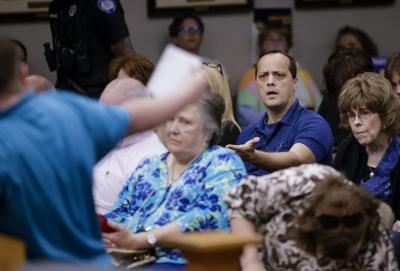It continues to amaze me that some people fight like crazy to keep books out of the hands of children.
I hope we all want kids to read, hoping they will become better informed citizens as they grow up.
What's going on in our state Legislature's closing days, however, has me thinking about what we want when it comes to building lifelong habits for learning, reading and knowledge among our youth — and whether we can agree on what constitutes inappropriate material for certain age groups.
A bill proposed by state Sen. Heather Cloud, R-Turkey Creek, would crack down on sexually explicit books and other content allegedly available to children and teens in public libraries.
Cloud's bill spells out what she and bill co-sponsor, Rep. Raymond E. Garofalo, Jr., R-Chalmette, want our libraries to consider "sexually explicit." It describes masturbation, sadomasochistic abuse, genital stimulation and "actual, simulated, or animated ultimate sexual acts, whether between human beings, animals, or a human being and an animal."
That's pretty explicit, and it barely, um, touches all the areas that Cloud and Garofalo feel should be included in the definitions. You can read the entire set of definitions by looking up Senate Bill 7 online.
With only a few days remaining in the 2023 legislative session, House members added some significant amendments to Cloud's bill, which requires libraries in all 64 parishes to establish a system of library cards allowing parents to determine what library volumes and collections their children may access and check out.
Like most folks, I don't want to make pornography and smut readily available to children. Recently I wrote that some of the people insisting on book restrictions should check out and read some of the books they want to keep away from children and teens. At least one reader took my challenge, checked out a book and shared some of what he found offensive. Frankly, I agreed with him. What he shared is totally inappropriate for elementary and middle school library patrons.
At the same time, I think we should trust our librarians to make professional judgments about which books and content should be purchased, accepted as donations, placed in specific sections for general use and which should be held in reserve.
There have been a host of content challenges and debates in Louisiana. Libraries in Livingston, St. Tammany, Lafayette and Rapides parishes have been targeted by political and religious conservatives demanding the removal of what they consider "pornography" and otherwise inappropriate content from library shelves.
The problem with generalized attacks on "pornography" in public libraries is who gets to define the term. When asked about that in 1964, U.S. Supreme Court Justice Potter Stewart famously said, "I know it when I see it."
It's a slippery slope, and the slipperiest part of that slope is deciding who gets to define what is and isn't pornographic.
In a number of recent instances, the would-be decider has been anyone who has a notion that something in one book or another might be obscene. That can lead to some absurd results.
Days ago, a 2022 Utah law was used as grounds to ban access to the King James Bible in elementary and middle school libraries based on a single anonymous request. That was followed by a request to review the Church of Jesus Christ of Latter-day Saints' Book of Mormon.
The initial complaint sprang from the fact that the Bible does indeed contain violence and acts of vulgarity.
The person seeking a review of the King James Bible said, “Now we can all ban books, and you don’t even need to read them or be accurate about it.... Heck, you don’t even need to see the book.”
If the Louisiana bill becomes law, we might see a similar backlash from people challenging books with reverse approaches like the one in Utah.
But should a single, anonymous person have such an impact? I don't think so.
That's why I agree with one amendment added to Cloud's bill.
State Rep. Tanner Magee (R-Houma) added language that requires at least 10 local, adult library patrons to challenge a library's book or materials before the local library board would be required to consider limiting its availability.
I like where that's going, but shouldn't we also require those challenging books to provide their names, proof that they're library patrons and evidence that they have actually read the challenged materials?
Standby for some Justice Stewart-like definitions.
I hope those challenging libraries' contents "see it" before they ask the rest of us to see what they see.










